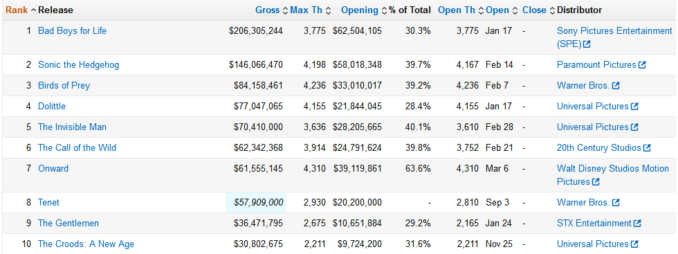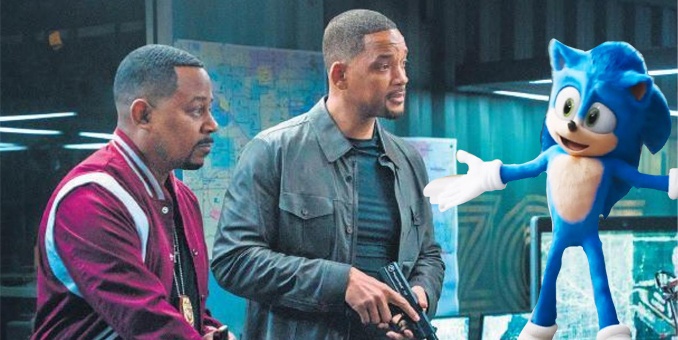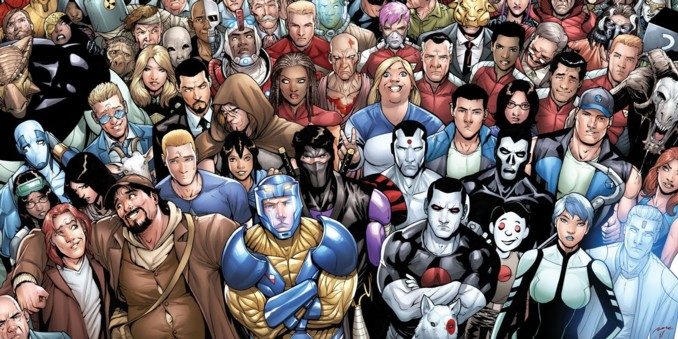
They say you can really tell a person’s character by how they act when the chips are down. If the same can be applied to the film industry, the 2020 will be THE year for finding out what makes movies tick. The COVID-19 pandemic hit the movie industry hard and shone a light on a lot of problem areas in the business. Many of which I will touch on in the following list.
Below is the list of the top ten domestic grossing films released in 2020, courtesy of Box Office Mojo (captured on 12/30/20):

So, what does this tell us?
1. There were some hits
 I figure might as well start off what might be a depressing column with some good news. There were two films that we can safely call hits: Bad Boys For Life and Sonic the Hedgehog. Granted, they were the two major releases to come and go before the pandemic hit, and neither would have even broke the top ten on last year’s list, and this is the first year since 1995 that there have been films that grosses under $100 million on it, but still, it’s something.
I figure might as well start off what might be a depressing column with some good news. There were two films that we can safely call hits: Bad Boys For Life and Sonic the Hedgehog. Granted, they were the two major releases to come and go before the pandemic hit, and neither would have even broke the top ten on last year’s list, and this is the first year since 1995 that there have been films that grosses under $100 million on it, but still, it’s something.
2. Foreign markets are way more important than the domestic market.
 The reason why those two films up above were hits was because of the money they made overseas. Both films made more than their budget, but to truly be successful a film has to earn three times their budget back. Neither film did that domestically. But when you add the international tallies, they more than hit that target.
The reason why those two films up above were hits was because of the money they made overseas. Both films made more than their budget, but to truly be successful a film has to earn three times their budget back. Neither film did that domestically. But when you add the international tallies, they more than hit that target.
Without the foreign grosses, we might not be talking about “Can the film industry survive?” but instead mourning its loss. Thanks to other countries being more on the ball with their pandemic control, unmitigated flops turned into just disappointments.
The importance of overseas box office in nothing new. But if the film industry makes it out of these dark times intact, we should all send a thank you note to moviegoers in other countries.
3. Budgets are way too high

Did you ever have a friend who spends money like its going out of style? They make good money but as soon as it comes in it goes right back out again? Never saves anything, isn’t at all frugal, just throws money around. And when the money coming in dries up, they are in big trouble. They are stuck with heavy debts and no way to pay them.
Ladies and gentlemen, Hollywood is that friend.
For years, Hollywood studios have been throwing hundreds of millions of dollars at their blockbuster films. It has been allowed to go on for so long because all you need is one $1 billion dollar hit to make up the difference. When the $200 million films start piling up in your stockrooms, any studio will begin to feel the pinch.
It doesn’t have to be that way though. The reason why Bad Boys For Life and Sonic the Hedgehog ended up making a profit was because their budgets were under $100 million. And when you have a Joker, a film made on the relative cheap that makes over a billion dollars, the profits look better.
Hopefully this will act as a wake up call to the studios, that they will realize that you don’t need to spend a lot of money to make a lot of money. Because a lean, mean fighting machine is what is needed if something like this comes back again.
4. Warner Brothers keeps screwing up

You might think we here at Film Buff Online really really hate Warner Brothers, with a hatred born of either utter stupidity, a hefty check from Disney, or both.
I can’t speak for Rich, but I do not hate Warner Brothers. On the contrary, if I had to pick a favorite movie studio, it would be Warner Brothers. They were home to one of my favorite films of all time: Casablanca. They worked with great directors ranging from Stanley Kubrick to Christopher Nolan, and put out classics ranging from The Searchers to Unforgiven, The Exorcist to the Matrix, and the Lethal Weapon franchise to the Harry Potter franchise. They have a rich history of classic films that have become an indelible part of my life. What’s not to love?
But in recent years, as the studio has been passed from corporate parent to corporate parent like an unwanted step-child, it has done a lot of lunkheaded things. Most of these fumbles happened in the realm of their DC Comics properties, which I have discussed here many, many , many times before. But this year, the studio decided to spread its bad ideas into other areas. Let’s count them down:
- In February, Warner Brothers gave the breakout star of 2016’s PG-13 rated Suicide Squad, Harley Quinn, her own film, Birds of Prey (and the Fantabulous Emancipation of One Harley Quinn. In their eternal wisdom, they decided to make this follow up R-rated, because R-rated superhero movies are kewl! (Not to toot my own horn here, but I predicted this in last year’s box office wrap up). Of course, the follow up ended up being a financial disappointment, mainly because the tweens and teens were now froze out of the R-rated sequel.
- In May, they launched their streaming service HBO Max. The service came with a $14.99 per month subscription price, almost twice many other service’s subscription price. But unlike those other services, HBO Max didn’t launch with a Stranger Things/The Mandalorian/Picard level appointment-viewing exclusive. They did have something, though.
- Around the same time, Warners announced that Zack Snyder’s Justice League, the special unseen version of the 2017 film that Snyder fans bullied, insulted, and slandered their way across the Internet to get made, would appear on HBO Max. It was rumored that the Snyder Cut was ready to go with little work that needed to be done to it. $70 million dollars later, Snyder’s vision will air on the service in four one-hour segments starting in March of 2021. So, not only did they show the bullying Snyder Bros that you can get whatever you want by being as obnoxious as you can be, they paid as much as they did to make the whole Joker film to make it happen.
- In July, Ray Fisher went public on Twitter, calling out Joss Whedon for his “gross, abusive, unprofessional, and completely unacceptable” work environment. Instead of keeping quiet about the investigation, Warners released a statement in September blowing off Fisher’s complaints as creative differences and saying that Fisher refused to cooperate with the studio’s investigators. Fisher clapped back at Warners’ claims, culminating in a November interview with Forbes where he admitted that his real issue was racist practices by Warners’ executives Geoff Johns, Jon Berg and Toby Emmerich, which included cutting people of color out of the cast and lightening the skin color of one of the actors. Warner Brothers has completed its investigation, with some unspecified disciplinary action handed down, but this is a bad look for the studio on many levels.
- In September, with phase one of the pandemic not complete gone away and the second phase yet to begin, Warners decided to be the studio to help lead people back into theaters. Instead of the highly anticipated Wonder Woman 1984 and its wider audience appeal, it decided to go with the more ponderous Tenet to lead the charge. The move was done to placate Christopher Nolan, because the director was pushing for the film to lead the charge into theaters. Maybe Warners thought the Christopher Nolan film would be the film to bring audiences back to theaters. It wasn’t. The film only made a little over $57 million domestically and $362 Worldwide. It is estimated to have lost anywhere from $50 million to $100 million for the studio.
- In November, the studio asked Johnny Depp to step down from his role as Grindelwald in their Fantastic Beasts franchise due to allegations of abuse that rose up during divorce proceedings with his ex-wife Amber Heard. This might be seen as a positive step forward in the #MeToo movement before your realize that A) those allegations were around back in 2016 when he was cast in the role and B) he will still be paid his full eight-figure salary for the second sequel even though he shot only one scene for the film.
- In December, Warners announced that due to the pandemic, it was going to follow the lead of what it did with Wonder Woman 1984 and release its whole 2021 slate in theaters and on HBO Max the same day. However, unlike their policy with that film, they wouldn’t be give any money to theaters to make up for sales taken away by the policy, and creators who had back-end deals pertaining to theatrical releases wouldn’t be made whole. The reason for the move seems less than genuine. With vaccines being rolled out, a light can be seen at the end of the COVID tunnel. Removing a whole years of films in that light makes it seem more like they are trying to shore up their flagging HBO Max platform than keep moviegoers safe. But in the process, they have angered and alienate theater owners, producers, directors and talent–four groups you need to make successful movies.
- Also in December, Zack Snyder stated in an interview with Entertainment Weekly that he was pressing for, and Warners was seriously considering, a theatrical release for his cut of Justice League. Keep in mind that the film is rumored clock in at 4 hours, a length that theaters would shy away from if it wasn’t a film that flopped for them three years ago or wasn’t being released during a pandemic. But don’t worry about that! Snyder sweetened the pot by saying the film would be rated R due to graphic violence and profanity. “Hey, Kids! Batman says fuck in this one! Buy your tickets now!”
Even the most rabid Warners fanboy can find some cause of concern in those bullet points up above. And you have to think that the is more than those that we haven’t been made privy to. Best case scenario, they have made poorly thought out business decisions. Worst case scenario, they are willing to ignore, condone or encourage racism, spouse abuse or online bullying as long as there is money to be made. Neither is good and if there are more years like this, it could be fatal.
5. Streaming and video on demand will not replace theaters just yet.

While the pandemic might have sent movie theaters reeling, there was another bad guy that started speculation that theaters were soon to become a thing of the past- Trolls World Tour.
When Universal announced that it would release the film in theaters and on video on demand on the same day, it was seen as a shot across the bow of the studios relationships with movie theaters. When the film set download records upon release, a paradigm shift appeared to be in the making. And when, as a result, Universal said it was going day and date digital for all its future films, the bells of doom started clanging for theaters.
But now that the dust settled, let’s take a look at this war. First, a caveat. Hollywood budgets is where creative accounting thrives. And the digital realms often requires forensic accounting to get an estimate. So these figures are the best we could find around the Internet, but might not be 100% spot on.
Top end estimates for a budget for Trolls World Tour was $110 million. Add to that another $100 million in advertising, and you need around $210 million to make a profit. The film supposedly made $150 million in video on demand rentals at $20 for a 48-hour rental. Add to that, another $49.1 million in theaters worldwide (of which the studios only get a percentage of) and $45 million in DVD/BLU-Ray sales, you have a total of $244.1 million. That leaves a $34.1 million profit. For you or me, we’d be ecstatic over getting $34.1. But for Hollywood, that’s pocket change or at least far less than they’d make potentially in a non-pandemic theatrical release. And we must note that Universal had to share the VOD grosses with the VOD outlets, albeit at a more beneficial percentage than the revenue they share with theaters.
Then there is Mulan. Disney did the same day and date with that movie, with one major difference: It would go to its Disney+ service as a $30 early rental. You’d be able to see it the same time as it was in the theaters, and two months before it came to the service for free. The film cost $200 to make. If we go with the high estimate for grosses, it made $93 million through its at home gambit, which, since Disney owns Disney+, it didn’t have to share its grosses with another outlet. Add to that $70 million it made in theaters and $10 million on the DVD/Blu-Ray market, you have $173 million in grosses–far below its budget.
And, as you know, both these experiments happened when a majority of people in the US were quarantined at home and itching for entertainment. A majority of people who would go see these films in the theaters rankle at the thought of pay as much for a 2-day rental as you would a DVD copy of the film or paying an extra $30 to see a film on a service you already pay $7 a month for, especially when it will be free if you wait a couple months.
So, until Hollywood gets its budgets under control or creates content that fans absolutely need to see, the theaters will still make them more of their money.
6. Moviegoers still stayed away after COVID numbers declined, could be ominous sign for the future.
 While it is unlikely that streaming and video on demand will replace the grosses films get in the brick and mortar movie theaters, you can see why studios would be willing to press that issue. Because audiences aren’t willing to head back into the auditoriums any time soon.
While it is unlikely that streaming and video on demand will replace the grosses films get in the brick and mortar movie theaters, you can see why studios would be willing to press that issue. Because audiences aren’t willing to head back into the auditoriums any time soon.
If you’ll take notice, only two of the top ten films came out after the Coronavirus outbreak. Granted, there wasn’t a lot of big ticket blockbusters released–no Marvel films, no James Bond installment. But there were enough buzzworthy films in the release mix that you would think more films would have reached the $27+ million plateau needed to break the top ten.
If film is to bounce back, it needs to build up consumer confidence in the theater experience. Hopefully, that shouldn’t be a problem when the virus goes away. But until then, it doesn’t look like mass audiences will be back, no matter how much safety precautions are taken.
7. Birds of Prey was the number one superhero film of the year, not Sonic.
 Even though I dragged Warner Brothers through the mud a couple entries ago, I feel the need to step up and defend them now. If you look at that list above, it might be obvious that Birds of Prey was the highest grossing superhero movie of the year, ending Marvel’s 10-year dominance at the box office.
Even though I dragged Warner Brothers through the mud a couple entries ago, I feel the need to step up and defend them now. If you look at that list above, it might be obvious that Birds of Prey was the highest grossing superhero movie of the year, ending Marvel’s 10-year dominance at the box office.
Not so fast, say websites such as ScreenRant and Comic Book Resources. They say that Sonic the Hedgehog is the number one superhero of the year. To that, I say: no.
I don’t like to be the gatekeeper as what counts as a superhero film and what doesn’t, but I guess someone has to. Sonic is a video game adaptation. While he does have superpowers, I’d argue he isn’t a superhero. My definition might be too narrow, but I believe a superhero film is either an adaptation of a superhero comic or addresses the tropes of superhero comics. Sonic does neither.
If Sonic is a superhero, who else is? Mario? Lara Croft? Samus? And, briefly stated, the plot of the Sonic film is a superpowered alien on the run from government agents who want to examine him. If that makes it a superhero film, then I guess E.T.: The Extra-Terrestrial is a superhero movie then.
Listen, being that you are the number one superhero film in a year that Marvel didn’t put out any films is like bragging that you beat the Los Angeles Lakers on a night when LeBron James and Anthony Davis didn’t play: It still counts, but it’s really not that much of an accomplishment. That being said, picking Sonic as the top superhero film this year seems like an obvious diss at Warners/DC Comics. Let them have the win.
8. Valiant shared universe might be a non-starter
 When they first announced that the Valiant line of comic books would be adapted into film, I was excited. The company seemed ready made for a cinematic universe. It has dozens of interesting characters, interweaving storylines, and was fresh enough that it might have a good chance of catching the moviegoers fancy. It wouldn’t overtake Marvel or DC, but could serve as a good alternative.
When they first announced that the Valiant line of comic books would be adapted into film, I was excited. The company seemed ready made for a cinematic universe. It has dozens of interesting characters, interweaving storylines, and was fresh enough that it might have a good chance of catching the moviegoers fancy. It wouldn’t overtake Marvel or DC, but could serve as a good alternative.
First up would be Bloodshot, a film that has been in development since 2012. it seemed like they were going to make a serious run at it, hiring Vin Diesel for the lead and supporting him with quality actors such as Sam Heughan, Eiza González, Toby Kebbell, and Guy Pearce.
Then it had the distinct misfortune of being launched during the worst pandemic in 100 years.
Bloodshot‘s grosses weren’t enough for it to crack the top ten, and when you add video on demand and home video, it might have earned just enough to make back its budget, but not much more. Plans are still afoot to continue with the Valiant Cinematic Universe, but I will be surprised if it can recover from its weak first step.
9. The Oscars next year will be extremely screwed up.
 There was a joke I made to my movie loving friends earlier this year that because of the limited amount of films being released this year due to the virus, we might hear “The Oscar for Best Picture goes to Bad Boys for Life” at this year’s ceremony.
There was a joke I made to my movie loving friends earlier this year that because of the limited amount of films being released this year due to the virus, we might hear “The Oscar for Best Picture goes to Bad Boys for Life” at this year’s ceremony.
The Academy has taken steps to ensure that horrible fate does not happen. It has moved the awards ceremony to April 25, 2021 and extended the eligibility deadline until February 28, 2021 and will allow films that debuted on streaming services to be eligible for awards.
This means that there are already a number of films that are Oscar contenders, most notably Nomadland, The Trial of the Chicago 7, Mank, and some others.
But this also means that the Academy faces a more extreme version of the problem it faces every year: nominating films few people have ever heard of, let alone seen. This has been given as one of the possible causes of the televised ceremony’s drop in ratings over the years and the reason why the Academy tried to add a “Best Popular Film” category. It’s highly unlikely that any of the films in that top ten list up there will be among the list of Best Picture nominees, and just because there will be nominated films that are on streaming, it doesn’t mean anyone will be watching them.
Add to that the fact that the Academy is planning an in-person ceremony in April, which they scheduled in the hopes that COVID-19 would be a thing of the past by then. If it isn’t, you will probably see a lot less big-name stars wearing fancy dresses than you have in the past. That takes away another big draw for the telecast. It will be interesting to see what the Academy will do if that happens.
10. Wonder Woman 1984 might be the light at the end of the tunnel

A lot of the entries on this list present a rather grim future for films. However, I want to leave this post on an optimistic note. And it’s only fitting that the note come from one of the most optimistic comic book characters DC has.
Wonder Woman 1984 earned $16.7 million domestically in its opening weekend. While not enough to crack the top ten (it currently sits at #19), it is the second highest grossing opening of the COVID era, behind its studio mate, Tenet. But that gross looks even more impressive when you consider that it debuted on HBO Max the same day. Meaning, people had the option of sitting at home to watch it and still made it out to theaters to see it on the big screen.
Granted, this is baby steps. If it was release at a time with no virus to worry about, its opening grosses could have possibly been more than five times that amount. And the incredibly divisive reaction to the film might mean a big drop in theater grosses this week. But if you are looking for hope for the future. Wonder Woman 1984 will give it to you.



